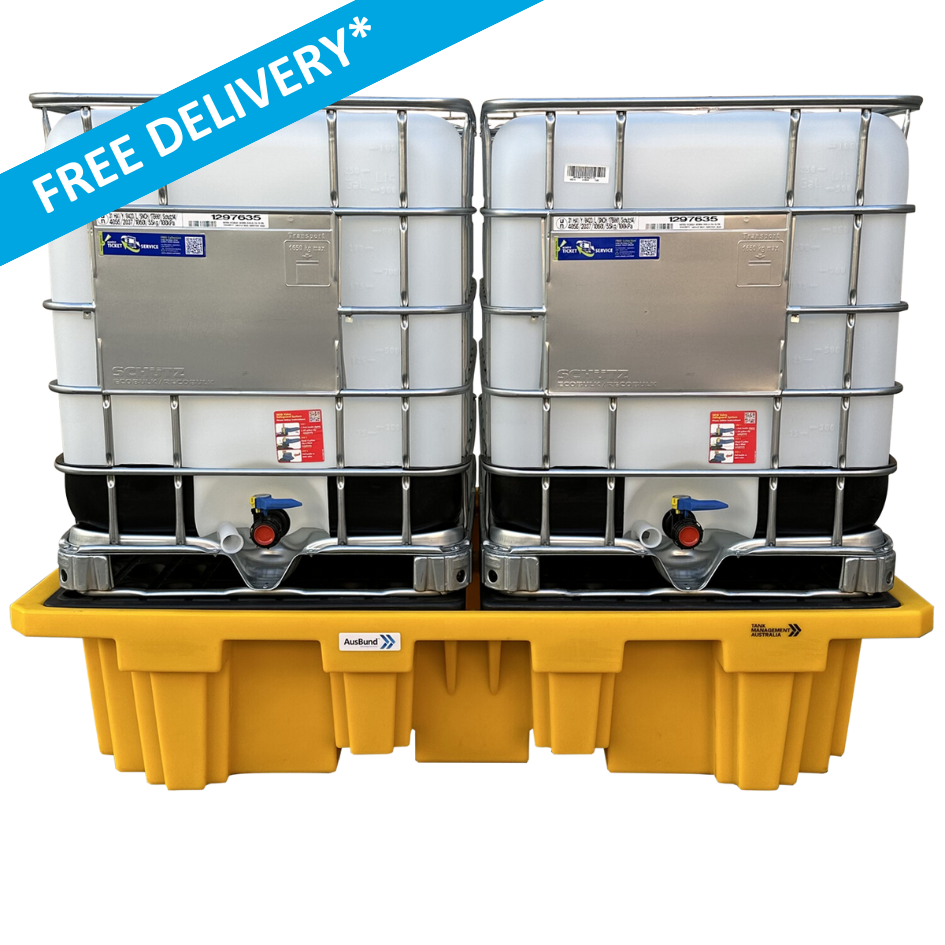
Plastic vs. Steel IBC Bunds: Which Spill Containment Solution is Right for You?
When handling bulk liquid storage and transportation, spill containment is a critical consideration for businesses in industries such as agriculture, mining, chemical storage, wineries, and brewing. Intermediate Bulk Container (IBC) bunds play a crucial role in secondary containment, preventing hazardous spills and ensuring compliance with Australian Work Health and Safety (WHS) regulations.
Choosing between plastic and steel IBC bunds depends on factors such as chemical compatibility, fire resistance, durability, cost, and industry requirements. This guide will help you determine which solution is best for your operations.
Plastic vs. Steel IBC Bunds: Key Differences
Feature | Plastic IBC Bunds | Steel IBC Bunds |
Material | Low-Density Polyethylene (LDPE) | Galvanised or Coated Steel |
Chemical Compatibility | Ideal for corrosive chemicals (acids, alkalis, cleaning agents) | Best for flammable liquids, oils, and non-corrosive chemicals |
Fire Resistance | Not fire-resistant; melts under extreme heat | Highly fire-resistant, meeting AS 1940-2017 requirements |
Durability & Impact Resistance | Lightweight but less impact-resistant | Heavy-duty, high load capacity, and impact-resistant |
Maintenance | Low-maintenance; resistant to rust and corrosion | Requires coating or paint protection against corrosion |
Transport & Forklift Use | Generally for static storage only | Suitable for transporting IBCs via forklift |
Cost | More affordable, mass-produced, lightweight | Higher initial cost but longer lifespan |
Environmental Considerations | Recyclable but non-biodegradable | More sustainable due to longevity |
Industry-Specific Recommendations
Different industries have specific needs for spill containment and IBC bunding. The choice between plastic and steel bunds depends on the chemicals stored, transportation needs, regulatory compliance, and environmental impact. Choosing the right bunding solution is essential for safety, efficiency, and compliance with Australian regulations.
Agriculture & Brewing
Businesses storing fertilisers, cleaning agents, and non-flammable liquids benefit from plastic IBC bunds due to their chemical resistance and affordability. Plastic spill pallets prevent leaks from contaminating soil and waterways. Since these operations often handle non-flammable but corrosive liquids, plastic bunds are a cost-effective, durable option that meets environmental regulations. They are also easier to clean and maintain, making them practical for frequent spill management.
Mining & Chemical Storage
Industries dealing with hazardous and flammable substances should use steel IBC bunds for their fire resistance and compliance with AS 1940-2017 regulations. Mining and chemical sectors often handle highly reactive materials requiring bunds that withstand high temperatures and combustion risks. Steel bunds offer superior durability, impact resistance, and a longer lifespan, ensuring long-term cost savings despite their higher upfront cost.
Logistics & Transport
For frequent IBC movement, steel bunds are ideal as they endure forklift use and heavy industrial environments. Logistics operations need bunds that handle repeated lifting, stacking, and relocation without compromising safety. Steel bunds resist structural damage, making them better for transit-heavy operations. Plastic bunds, however, are more suited for static storage, prioritising stability and chemical resistance over mobility.
Regulatory Compliance for Spill Containment
To prevent environmental contamination and reduce workplace hazards, Australian businesses are required to comply with strict WHS regulations designed to manage spill containment. These regulations ensure that companies have the necessary measures in place to handle and control spills effectively, protecting both employees and the surrounding environment from potential harm.
- AS 1940-2017 (Flammable & Combustible Liquids) requires spill containment systems for flammable liquids. Steel bunds are recommended due to their fire-resistant properties.
- AS 3780-2008 (Corrosive Substances) mandates that bunds be chemically resistant to corrosive materials. Plastic bunds are preferred for acids and alkalis.
- WHS Regulation 357 mandates spill containment measures for workplaces handling hazardous chemicals. Failure to comply can result in fines of up to AUD 30,000 for businesses.
Choosing the Right IBC Bund for Your Business
To select the best spill containment solution, consider:
What type of chemicals are you storing?
Flammable liquids → Steel bunds
Corrosive chemicals → Plastic bunds
Will the bund be moved by forklift?
No → Plastic is cost-effective for static storage
Yes → Steel bunds offer better durability for transport
What are the fire safety risks?
High fire risk → Steel bunds comply with safety regulations
Low fire risk → Plastic bunds are sufficient
Which IBC Bund is Right for You?
Both plastic and steel IBC bunds have distinct advantages depending on your industry, chemical storage needs, and regulatory requirements.
Plastic IBC Bunds Are Best For:
Corrosive chemical storage
Cost-effective, static containment
Agriculture, brewing, and general manufacturing
Steel IBC Bunds Are Best For:
Flammable liquid storage
Industrial environments with forklift movement
Mining, chemical, and logistics industries
To ensure compliance and workplace safety, invest in the right IBC bunding solution that aligns with your operational needs.
Need help selecting the right bunding solution? Tank Management Australia offers a range of plastic and steel IBC bunds designed to meet Australian safety regulations. Contact us today for expert advice and solutions tailored to your industry.







 Previous article
Previous article